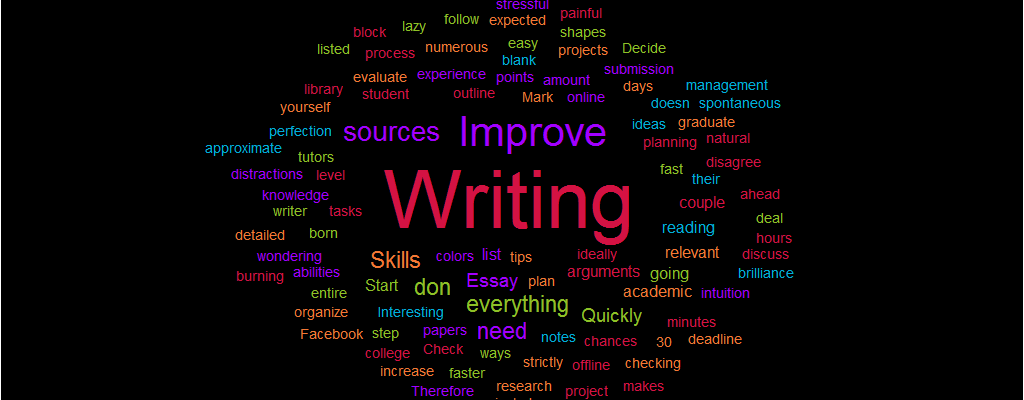How to Improve Your Writing Skills Quickly
Publication Date:

There is no way a student can graduate without writing numerous academic projects of all shapes and colors. Your tutors evaluate the level of your skills and knowledge through writing tasks, and you are expected to show the best of what you have. However, if you don’t feel like a natural-born writer, you must be wondering, what are the ways to improve your abilities. And ideally – to improve them fast. Check these tips and find an easy way to perfection!
Keep everything in order
You need to plan the entire process and follow it strictly. Decide and organize each step, one by one. First, are you going to use online or offline sources? Don’t be lazy and go to a college library, because this will increase your chances to find relevant sources faster. Second, if you are going to do research at home and use online sources, make sure to keep yourself away from distractions. If you cannot live 30 minutes without checking your Facebook, then block it until you are done with the project.
Then, move to planning. Essay writing is never about intuition and spontaneous brilliance. Therefore, you need to make a detailed list of everything you are going to discuss. Planning also includes time management. Think about an approximate amount of hours you need to deal with all the ideas you have listed. Start ahead, because nothing makes essay writing that stressful and painful than a burning deadline. Interesting ideas never come when you are nervous. As an alternative, you may find reliable essay writing services to have a plan B.
Work with sources smartly
If your professor allows you to go beyond the reading list, then do it! This way, you will compose an original work, different from all the rest in class. If the reading list is fixed, you should read some additional materials anyway, because this will expand your perception. Just keep up with relevant and useful ones. Focus on academic sources only. They include:
- Newspaper articles
- Academic journals
- Books and encyclopedias
- Surveys, interviews, statistics
Make notes when you are reading and write down everything you find interesting (and relevant, of course). Don’t neglect the note-taking, because this will save you a considerable amount of time. Don’t forget to use your notes as quotations to support your arguments. Mark quotes from different sources with colors, and you won’t confuse them. Also, add some comments about the author’s main points. It is crucial to analyze and engage in discussion with scholars, not just rephrase their claims or disagree with them. Compare their experience to your own or the experience of other authors.
What to do with a blank sheet of paper?
The most complicated task is to overcome your blank page fear. Surely, you want your first sentence to make your readers say, “wow.” You want it to be no less than genius, but this is something that keeps you stuck. To get started, you need to write at least something, and it doesn’t have to be perfect. Try not to worry about being brilliant – just start writing and come back to improve things later.
If this doesn’t help, come back to your outline and reread it. Then write down your point in the simplest possible way. Actually, you can start with any part of the body section, if the idea of writing an introduction freaks you out.
What to do if you have changed your mind?
It is a frequent situation when suddenly you realize that you don’t really believe in the arguments you are trying to express. They turn to be unconvincing, and you disagree with your own points. This is especially the case when you have a couple of days for an essay: the arguments were okay yesterday, but they seem to be lame today. If this happens, come back to your outline and think about changing the emphasis to produce different statements. There is no need to rewrite everything, but some corrections are necessary.
Final tips
- Always revise your papers before submission. Read them carefully for a couple of times and improve them until you are sure that everything satisfies you;
- Pay attention to formatting. All of those bibliographies, running headings, and margins are important. Some professors mark the poorly-formatted papers down;
- If you have time before the submission, come back to your writing in a couple of days after you finish it. Proofread it again to eliminate mistakes and strengthen the weak parts.